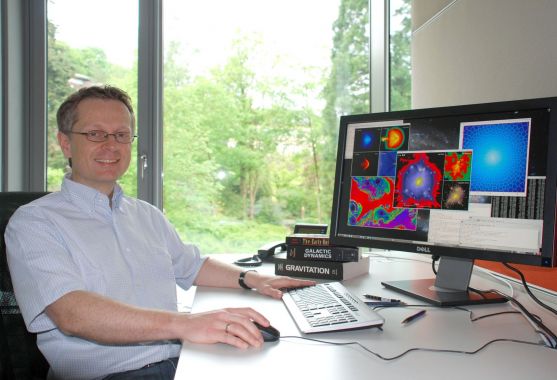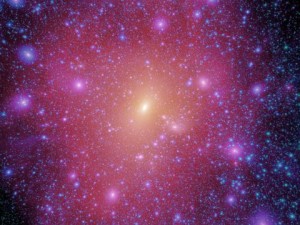The Universe in a Computer

The astrophysicist Volker Springel leads a new research group at the Heidelberg Institute for Theoretical Studies (HITS) – appointment to the University of Heidelberg – computer simulations to explain how the universe developed and “to bring the Dark Matter to light”
He deals with a topic that can not be examined experimentally: the evolution of the universe since the Big Bang. Therefore, the astrophysicist Volker Springel generates artificial universes with computer simulations to observe the evolution of galaxies and stars. His “laboratory” is located in the Heidelberg Institute for Theoretical Studies (HITS), the research institute of the Klaus Tschira foundation. In March 2010 Volker Springel established the new research group “Theoretical Astrophysics” at the HITS. The position is linked with a professorship for astrophysics at the University of Heidelberg; his official residence is the HITS. His appointment also shows the good and intensive collaboration between HITS and the University of Heidelberg.
“With Volker Springel we gained a brilliant scientist for this new group” says Klaus Tschira, the founder of the Klaus Tschira foundation and managing director of the HITS. “His background fits excellent into the concept of HITS, to process and structure huge amounts of data in its research fields.”
Volker Springel studied physics in Tübingen and Berkeley and did his PhD at the LMU Munich and the Max Planck Institute for Astrophysics (MPA) in 2000. After a Post Doc position at the Harvard Center for Astrophysics he returned to the MPA, leading since 2005 a research group for numerical cosmology. Already as a young researcher, the Studienstiftung scholarship holder was awarded, beside others, with the Otto Hahn Medal of the Max Planck Society and the Heinz Maier Leibnitz Prize of the German Science Foundation. In November 2009 the astrophysicist was honoured with the Klung Wilhelmy Weberbank Prize, worth 100.000 Euro and one of the most highly esteemed privately funded scientific awards in Germany.
The 39 years old focuses his research on the formation of galaxies and black holes as well as on numerical cosmology. Using simulations that process huge amounts of data, he deals especially with the mystery of the Dark Matter. Dark Matter is seen neither as stars nor as gas clouds, rather it is thought to consist of unknown elementary particles. The Dark Matter acts as cosmic cement, which stabilises the galaxies. Although according to the latest estimates more than eighty percent of the matter in space consists of Dark Matter, its existence has not been proven yet.
“Using our simulations we aim to bring the Dark Matter to light,” explains Volker Springel. He succeeded in a first step towards his aim with his so called “Millenium Simulation”: Together with his colleagues he constructed an artificial universe at the MPA in Garching which they used to calculate how the universe develops after the Big Bang if it indeed mainly consists of Dark Matter. The result was stunning: the observed distribution of the visible matter corresponded quite well with the prediction of the simulation.
Volker Springel starts a new simulation project this year, called “Millennium XXL”. It is able to calculate 300 billions of particles in total, which is thirty times as much as in the Millennium Simulation. The project is carried out together with the Virgo Consortium, an international association of astrophysicists who work on cosmological simulations on supercomputers. The supercomputer for the “Millennium XXL” project is located in Jülich, Germany. Volker Springel
develops the simulation software for the project in Heidelberg and will publish a new version of his simulation code “Gadget 3” in summer. The “Theoretical Astrophysics” group at the HITS will be strengthened with several Post Doc fellows in September, and Stanford professor Tom Abel will join HITS soon as the first guest scientist.
Press Contact:
Dr Peter Saueressig
Public Relations
HITS Heidelberg Institute for Theoretical Studies
Tel: +49-6221-533-245
Email: peter.saueressig@h-its.org
Scientific Contact:
Prof Dr Volker Springel
HITS Heidelberg Institute for Theoretical Studies
Tel: +49-6221-533-241
Fax: +49-6221-533-298
Email: volker.springel@h-its.org
About HITS
HITS, the Heidelberg Institute for Theoretical Studies, was established in 2010 by physicist and SAP co-founder Klaus Tschira (1940-2015) and the Klaus Tschira Foundation as a private, non-profit research institute. HITS conducts basic research in the natural, mathematical, and computer sciences. Major research directions include complex simulations across scales, making sense of data, and enabling science via computational research. Application areas range from molecular biology to astrophysics. An essential characteristic of the Institute is interdisciplinarity, implemented in numerous cross-group and cross-disciplinary projects. The base funding of HITS is provided by the Klaus Tschira Foundation.
